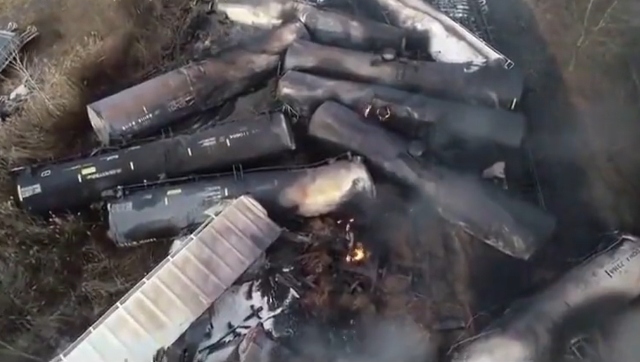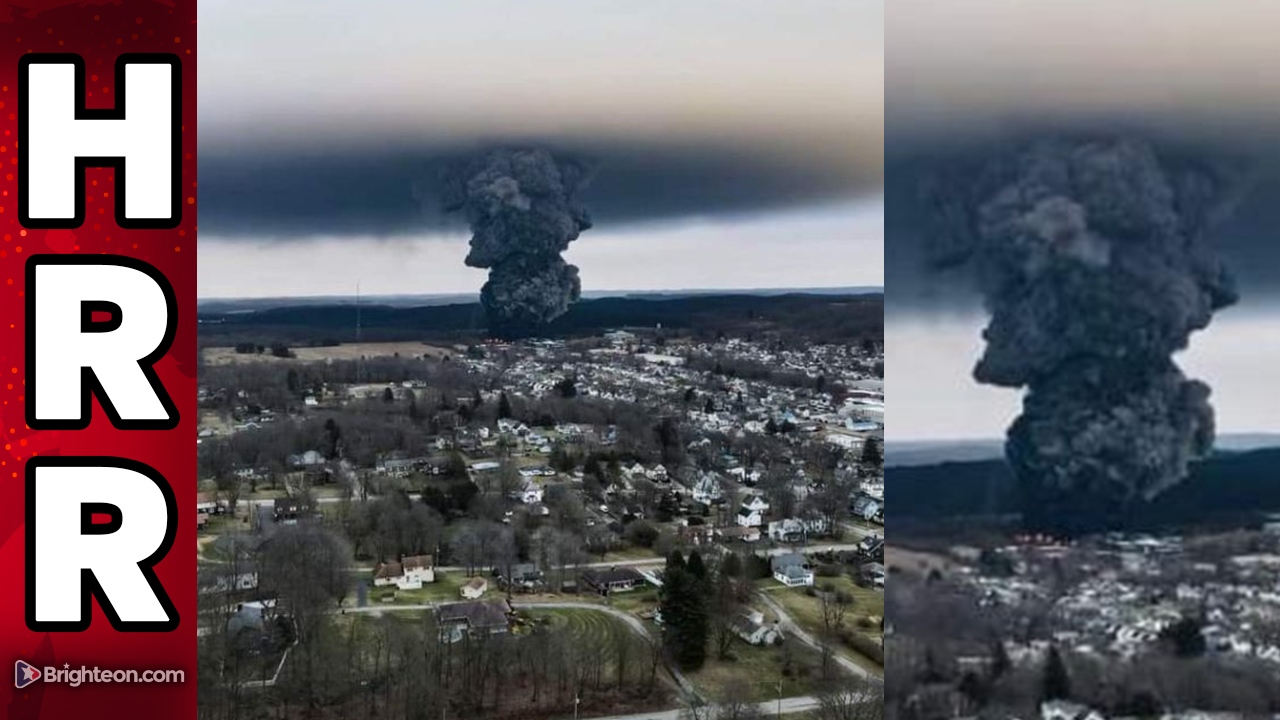Train that derailed causing massive chemical spill in eastern Ohio broke down days earlier because of weight
02/20/2023 / By JD Heyes

The Norfolk Southern train that derailed in East Palestine, Ohio, earlier this month, spilling hundreds of thousands of gallons of poisonous chemicals into the environment and spewing into the air in great plumes of smoke had issues just days before it derailed on Feb. 3.
NBC News reports that the train, designated 32N, “which originated from Madison, Illinois, on the evening of Feb. 1, broke down at least once before derailing.” The report noted further that “the employees say there were concerns among those working on the train over what they believed was the train’s excessive length and weight — 151 cars, 9,300 feet long, 18,000 tons — before it reached East Palestine, which contributed to both the initial breakdown and the derailment.”
One of the employees told the network: “We shouldn’t be running trains that are 150 car lengths long. There should be some limitations to the weight and the length of the trains. In this case, had the train not been 18,000 tons, it’s very likely the effects of the derailment would have been mitigated.”
The outlet noted further:
Norfolk Southern’s CEO Alan Shaw declined an interview. In a statement to CBS News, a company spokesperson said “the weight distribution of this train was uniform throughout” and included a mid-train locomotive “which helps manage the dynamic forces of the train” and reduces mechanical issues.
“Assigning a ‘reputation’ to a train that fluctuates by thousands of tons on a regular basis is inaccurate,” the spokesperson told NBC News of the employee observations about the train’s length and weight. The spokesperson added that a “longer and heavier train” used to be on the same route before it was “split into two shorter, lighter trains in the past few months as part of a regular review.”

Sarah Feinberg, who served as administrator of the Federal Railroad Administration (FRA) from 2015 to 2017, disagreed. “When I was FRA administrator, I was not happy with the lengths of the trains, and they were 80 or 90 cars long,” she said. “This train was 50 percent longer.”
The train had been carrying a load of hazardous materials, including propane and ethanol. The derailment caused several of the cars to rupture and spill their contents, sending a plume of smoke into the air. Emergency services were immediately called to the scene, and they quickly began evacuating residents from nearby homes and businesses.
As more emergency personnel arrived on the scene, they worked to contain the fire and prevent the spread of the hazardous materials. It took several hours to fully extinguish the blaze and clear the wreckage from the tracks.
Fortunately, no one was injured in the derailment. But the incident has left a lasting impact on the community. Many residents were forced to evacuate their homes for several days as the area was deemed too dangerous to enter. The cleanup efforts have begun and are extensive, with crews working around the clock to remove the damaged train cars and dispose of the hazardous materials. But the damage may be long-lasting, as noted by Sen. J.D. Vance (R-Ohio).
He posted a video on social media showing chemical damage to a nearby waterway.
To those saying it’s all under control in Ohio (not many, I know) watch as @JDVance1 scrapes a creek bottom w/a stick
Instant chemical rainbow appears
This is people’s water supply we’re talking about and chemicals have been found hundreds of miles away
pic.twitter.com/DIKxqgylDJ— DC_Draino (@DC_Draino) February 16, 2023
As for rail transportation in general, Norfolk Southern staffers told NBC News they are being worked past their limits.
“The workers are exhausted, times for car inspections have been drastically cut, and there are no regulations on the size of these trains,” said one employee.
Sources include:
Submit a correction >>
Tagged Under:
chemical spill, deadly chemicals, East Palestine, environment, environmental disaster, hazmat, J.D. Vance, ohio, propane, train cars, train derailment
This article may contain statements that reflect the opinion of the author




















